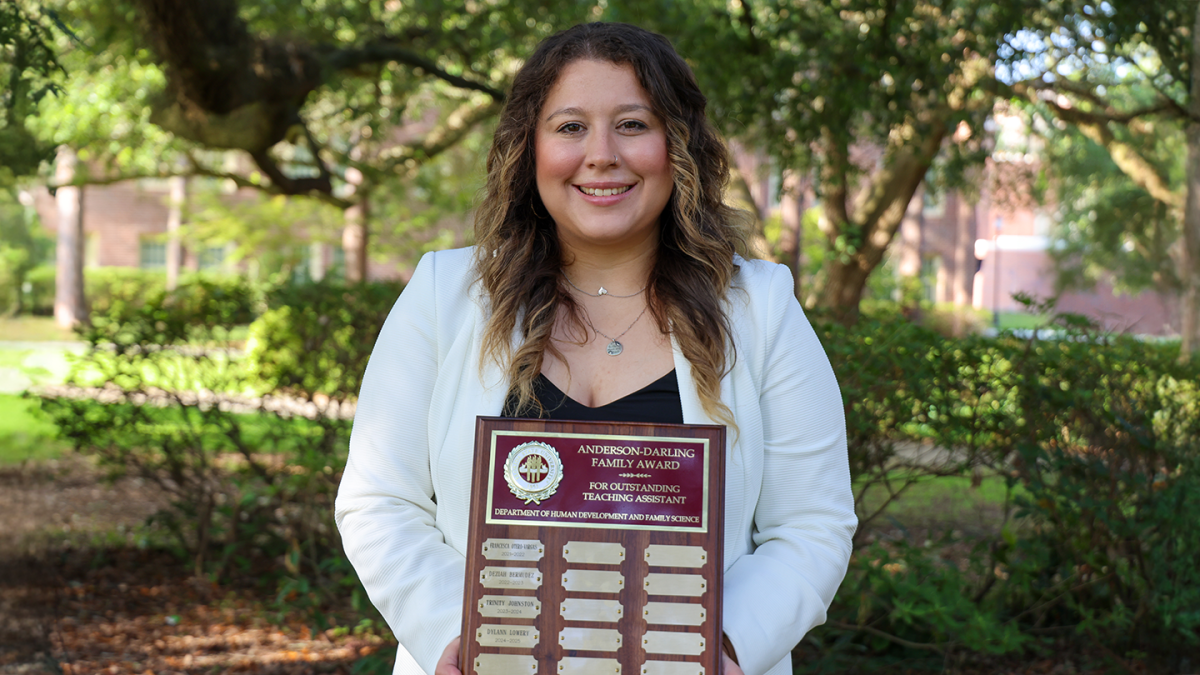Dylann Lowery has been drawn to education since the start of her college journey. As an undergraduate student at Oklahoma State University, she originally majored in Elementary Education, envisioning a future in the classroom. But it wasn’t until years later, after clinical work and graduate research at Auburn University, then teaching college courses as a doctoral student at FSU, that she fully realized just how meaningful teaching could be.
Lowery, a fourth-year doctoral candidate in the Marriage and Family Therapy (MFT) program at Anne’s College, is this year’s recipient of the Anderson-Darling Family Graduate Teaching Assistant Award. The award recognizes exceptional teaching ability among graduate teaching assistants in the Department of Human Development and Family Science. Lowery says the award affirms the deeper reasons behind her commitment to education.
“It validates the work that I’ve been doing and inspires me to continue to go further,” she said. “It’s affirming to hear, ‘you’re doing well, keep going, this is important work.’ And I think sometimes, specifically with teaching, you don't always get that.”
Despite her passion for education, Lowery felt uncertain after her initial experience in her Elementary Education program at Oklahoma State. “I had my first classroom experience and realized I didn’t know if that was for me,” said Lowery, who is originally from the small town of Woodward, Oklahoma. An academic advisor pointed her in the direction of human sciences, sparking both a change in her major and her professional journey.
While completing her master’s degree in Marriage and Family Therapy at Auburn University, Lowery found herself drawn to the clinical side of the work. But as she gained experience, she also began to see the broader potential of teaching and research as powerful tools to make a lasting impact—both within the field and in the communities she hopes to serve.
“I realized that within our field, there's so much to be done with research, and teaching those newer generations about the research that we're doing,” she explains. That led her to pursue a doctorate at FSU, drawn by the MFT program’s strong support system, including financial backing and the opportunity for doctoral students to teach undergraduate courses.
As a Hispanic, first-generation college woman in the field of Marriage and Family Therapy where she hasn’t often seen others who share her background, she felt a responsibility to become a source of mentorship and representation for others.
“I knew that I wanted to be someone that students who were like me could come to and ask for advice or opinions or just have a mentorship,” she says. “But also, I knew that I wanted to engage in impactful teaching and research.”
Her research within the MFT program focuses on trauma-informed practices and supporting individuals who have experienced complex trauma. “Being able to reach people from all different walks of life, and also have their voice represented in research is what inspired me and led me on this path to pursuing my doctorate,” she says.
Both her research and clinical experiences have shaped her teaching philosophy. She encourages students to look beneath the surface and recognize how relationships shape every aspect of human development, behavior, and well-being, and how the content in her courses can be applied in a wide range of contexts.
“My hope in teaching is that regardless of where you end up in the world or where you go, you understand the importance of seeing below the iceberg,” she says. “Mental health symptoms or even physical ailments sometimes can stem from difficulties in relationships.”
Lowery’s goal is to help students recognize the everyday value of human sciences, no matter their future career. “Whether they go into the medical field, or teaching, or become a business owner, whatever it may be, I try to bridge my clinical experience to course content to explain how it shows up in the world. We can talk about these concepts of communication or attachment, but how will this show up in the real world when working with people?”
As an instructor, Lowery has taught Family Relationships Across the Lifespan and Parenting, and she has served as a teaching assistant for courses in adolescent and child development.
“Because we're in human sciences, not many people have the opportunity in high school to learn about how humans relate to each other, or how people parent each other,” she says. “I think college is sometimes the first way we get to see that. And working with students who can take the information and move it beyond their textbook was really the thing that inspired me.”
Looking ahead, Lowery hopes to become a faculty member in an MFT program, where she can continue teaching, mentoring, and shaping the next generation of therapists. She also wants to extend that work beyond academia.
“I want to teach undergrads and graduate MFT students, but I also want to bridge the gap,” she says. “I don’t want the knowledge to just stay in higher education. I want to expand it into our communities through different parenting courses for community members, maybe, or different events to help people learn and influence the bigger picture.”
She also has ideas for new courses that address unmet needs—particularly in trauma education.
Her passion and visionary thinking are what led her to receive the Anderson-Darling Award.
For a doctoral student in the midst of intense research, clinical work, teaching, and course loads, receiving an award is a strong motivator, Lowery says.
“I think these scholarships and these awards mean more than people will ever say or recognize,” she says. “And I think it hits on a deeper sense of purpose.”


